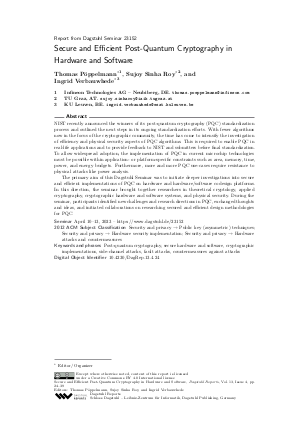Secure and Efficient Post-Quantum Cryptography in Hardware and Software (Dagstuhl Seminar 23152)
Authors Thomas Pöppelmann, Sujoy Sinha Roy, Ingrid Verbauwhede and all authors of the abstracts in this report
-
Part of:
Issue:
Dagstuhl Reports, Volume 13, Issue 4
Part of: Volume: Dagstuhl Reports, Volume 13
Part of: Journal: Dagstuhl Reports (DagRep) - License:
 Creative Commons Attribution 4.0 International license
Creative Commons Attribution 4.0 International license
- Publication Date: 2023-11-02
File

PDF
DagRep.13.4.24.pdf
- Filesize: 2.14 MB
- 16 pages
Document Identifiers
Subject Classification
ACM Subject Classification
- Security and privacy → Public key (asymmetric) techniques
- Security and privacy → Hardware security implementation
- Security and privacy → Hardware attacks and countermeasures
Keywords
- Post-quantum cryptography
- secure hardware and software
- cryptographic implementations
- side-channel attacks
- fault attacks
- countermeasures against attacks
Metrics
- Access Statistics
-
Total Accesses (updated on a weekly basis)
0PDF Downloads0Metadata Views
Abstract
NIST recently announced the winners of its post-quantum cryptography (PQC) standardization process and outlined the next steps in its ongoing standardization efforts. With fewer algorithms now in the focus of the cryptographic community, the time has come to intensify the investigation of efficiency and physical security aspects of PQC algorithms. This is required to enable PQC in real-life applications and to provide feedback to NIST and submitters before final standardization. To allow widespread adoption, the implementation of PQC in current microchip technologies must be possible within application- or platform-specific constraints such as area, memory, time, power, and energy budgets. Furthermore, more and more PQC use-cases require resistance to physical attacks like power analysis. The primary aim of this Dagstuhl Seminar was to initiate deeper investigations into secure and efficient implementations of PQC on hardware and hardware/software codesign platforms. In this direction, the seminar brought together researchers in theoretical cryptology, applied cryptography, cryptographic hardware and software systems, and physical security. During the seminar, participants identified new challenges and research directions in PQC, exchanged thoughts and ideas, and initiated collaborations on researching secured and efficient design methodologies for PQC.
Cite As Get BibTex
Thomas Pöppelmann, Sujoy Sinha Roy, and Ingrid Verbauwhede. Secure and Efficient Post-Quantum Cryptography in Hardware and Software (Dagstuhl Seminar 23152). In Dagstuhl Reports, Volume 13, Issue 4, pp. 24-39, Schloss Dagstuhl – Leibniz-Zentrum für Informatik (2023)
https://doi.org/10.4230/DagRep.13.4.24
BibTex
@Article{poppelmann_et_al:DagRep.13.4.24,
author = {P\"{o}ppelmann, Thomas and Roy, Sujoy Sinha and Verbauwhede, Ingrid},
title = {{Secure and Efficient Post-Quantum Cryptography in Hardware and Software (Dagstuhl Seminar 23152)}},
pages = {24--39},
journal = {Dagstuhl Reports},
ISSN = {2192-5283},
year = {2023},
volume = {13},
number = {4},
editor = {P\"{o}ppelmann, Thomas and Roy, Sujoy Sinha and Verbauwhede, Ingrid},
publisher = {Schloss Dagstuhl -- Leibniz-Zentrum f{\"u}r Informatik},
address = {Dagstuhl, Germany},
URL = {https://drops.dagstuhl.de/entities/document/10.4230/DagRep.13.4.24},
URN = {urn:nbn:de:0030-drops-192373},
doi = {10.4230/DagRep.13.4.24},
annote = {Keywords: Post-quantum cryptography, secure hardware and software, cryptographic implementations, side-channel attacks, fault attacks, countermeasures against attacks}
}
